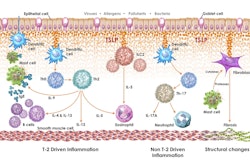
A biologic treatment for COPD has produced mixed results in a pair of phase 2a and phase 3 trials. Genentech, the developer of astegolimab, said in a news release that the drug met its primary endpoint in the Phase 2b ALIENTO study, showing that it reduced the annualized exacerbation rate (AER) by a statistically significant 15.4% at 52 weeks when the treatment was given every two weeks.
However, the phase 3 ARNASA study did not meet its primary endpoint of a statistically significant AER, demonstrating only a 14.5% reduction at 52 weeks when the treatment was given every two weeks.
Levi Garraway, MD, PhD, chief medical officer and head of global product development for Genentech, said the results do not mean the end of the road for astegolimab as a potential treatment for COPD.
“This was the first set of studies in an ‘all-comers’ COPD population,” he said. “We will discuss these data with regulatory authorities to evaluate the next steps for astegolimab.”
The company said the results across secondary endpoints were generally consistent in both studies, and the total number of exacerbations was lower than had been anticipated in both trials.
The studies were investigating astegolimab as an add-on treatment to standard of care maintenance therapy in people with moderate to severe COPD, including both current and former smokers with a history of frequent exacerbations.






















